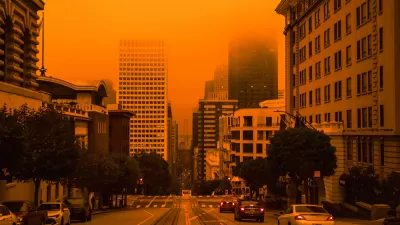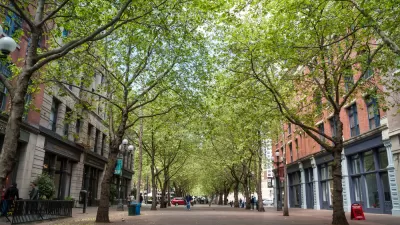To meet the U.N.’s global warming targets, city leadership is critical.
The international agreement struck in Paris last week has been hailed as an historic grand bargain that charts an ambitious course to limit global warming through reductions of greenhouse gas emissions, reforestation, and financial incentives for sustainable development.
"But while the agreement commits its 196 signatories to cut emissions and report progress on a national level, at least one-third of the carbon budget remaining to stay under 2 degrees Celsius is in the control of cities and local governments, and everyone at COP21 seemed to know it," writes Feargus O'Sullivan.
World Bank representative Rachel Kyte emphasized the importance of cities to the implementation of the agreement.
“Please understand that the fundamental financial health of cities will be absolutely fundamental to reaching Paris’ goals.”
Coalition-building at the city level has been going on for some time. Leaders from 436 cities around the world have committed to the Compact of Mayors, a coalition that represents 377 million people. Many urban leaders recognize that if sea levels rise as much as currently predicted, the land submerged in the sea would displace millions of their own constituents. According to O'Sullivan, city governments are working together "to compare practices, pool expertise and resources and make collective commitments that don’t necessarily require national rubber-stamping and can lead to tangible impacts."
O'Sullivan offers examples of local challenges in vulnerable urban regions. In Twshane, South Africa, an urban region that includes the city of Pretoria, harsh conditions in the natural environment combine with apartheid-era planning to create a complicated set of social, economic, and logistical problems that must be addressed in any effort to improve sustainability. "When unsustainable urban sprawl represents not just past planning choices but a firmly entrenched social hierarchy, the barriers to climate action are only likely to be greater," O'Sullivan writes.
In Melbourne, Australia, the city's efforts reduce emissions and the local climate conflicted with the national government's desire to sell dirty coal to China. So Melbourne built its own local market for renewable energy by collaborating with the local private sector.
"In many ways, Melbourne’s experience represents a coming-of-age of the urban sustainability movement," writes O’Sullivan. "The private sector is listening to cities and responding. Now it’s up to cities and national governments to continue the conversations that began at COP21 and continue the evolution."
FULL STORY: The Urban Planner’s Guide to a Post-COP21 World

Planetizen Federal Action Tracker
A weekly monitor of how Trump’s orders and actions are impacting planners and planning in America.

Congressman Proposes Bill to Rename DC Metro “Trump Train”
The Make Autorail Great Again Act would withhold federal funding to the system until the Washington Metropolitan Area Transit Authority (WMATA), rebrands as the Washington Metropolitan Authority for Greater Access (WMAGA).

The Simple Legislative Tool Transforming Vacant Downtowns
In California, Michigan and Georgia, an easy win is bringing dollars — and delight — back to city centers.

Albuquerque’s Microtransit: A Planner’s Answer to Food Access Gaps
New microtransit vans in Albuquerque aim to close food access gaps by linking low-income areas to grocery stores, cutting travel times by 30 percent and offering planners a scalable model for equity-focused transit.

This City Will Pay You to Meet Your Neighbors
A North Kansas City grant program offers up to $400 for residents to throw neighborhood block parties.

Commentary: Our Silence Will Not Protect Us
Keeping our heads down and our language inoffensive is not the right response to the times we’re in. Solidarity and courage is.
Urban Design for Planners 1: Software Tools
This six-course series explores essential urban design concepts using open source software and equips planners with the tools they need to participate fully in the urban design process.
Planning for Universal Design
Learn the tools for implementing Universal Design in planning regulations.
Smith Gee Studio
City of Charlotte
City of Camden Redevelopment Agency
City of Astoria
Transportation Research & Education Center (TREC) at Portland State University
US High Speed Rail Association
City of Camden Redevelopment Agency
Municipality of Princeton (NJ)





























